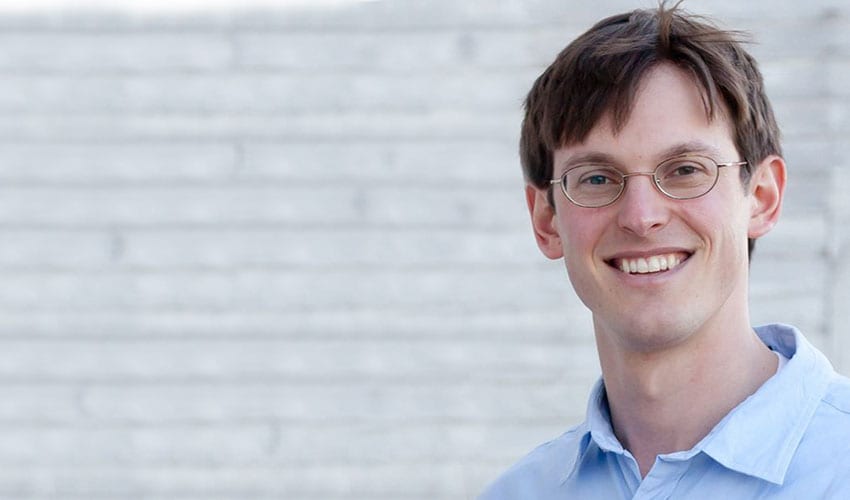Josh Hyman is an assistant professor in the Department of Public Policy, the Department of Economics, and the Neag School of Education at the University of Connecticut, so he spends the majority of his waking hours interacting with college students; however, he often wonders: how many students aren’t here that could be? And at what point do finances begin to play a detrimental role?
The study of economics was always the path he knew he would take, but it was during his senior year at Tufts University that he began to narrow his focus. As he wrote his senior thesis under the guidance of a wonderful mentor, he began to really delve into the way economics and education policy intersect, which he would further explore as a Rackham graduate student at the University of Michigan.
“My U-M education was really the most important part of my training…I can’t imagine having gone anywhere else,” Josh said. “It was Michigan that provided the research experience to get me on track to where I am today. The faculty, the advisors, and the coursework all set me up to be able to have discussions with peers in my field.”
As an alum, Josh focuses primarily on education policy and studies the ways in which policies can be changed to encourage students from low-income families to enroll in college. He suggests that these changes must be made before students even graduate high school, more specifically, when they are asked to take the ACT or SAT. For a student from a low-income family, the cost of taking a college admission exam is enough to prevent them from taking it at all. According to Josh, making the test free could be the first step to enrolling more low-income students in college. For instance, if a student takes the exam and earns a higher score than they originally expected they might be more motivated to apply for financial aid and attend a higher education institution, regardless of financial circumstances.
Josh’s current research seeks to discover how college preparedness impacts enrollment rates. In one of his studies, he has partnered with the State of Michigan to send tens of thousands of letters to students who did well on the ACT exam. The letter then points them to a website that provides resources for completing the college application process, in hopes that with that exposure, they are more likely to fulfill the enrollment process. The second study introduces a course into 30 schools in low-income areas to prepare students for college. This course covers everything from what kinds of colleges are out there, how to apply for financial aid, what makes an institution a good fit for a student, how to apply, what to expect, and how to succeed. Students will take the course during the fall semester of senior year and their college enrollment rates will be compared to students in schools without such a program to test its effectiveness. In both of these studies, students and schools that receive the “treatment” are randomly selected and compared to randomly selected “control” students and schools. Of course, randomized control trials like this cost money. Josh has received grant funding for this research, but he also hopes to use these programs to examine the impact of funding in schools and how much it truly matters.
Even while teaching and conducting his research, Josh continues to find time to support Rackham graduate students. Every summer, he returns to Ann Arbor to present at the Ford School of Public Policy, and provides insight into his research and what scholars can do within their own fields. He notes how important it is for current doctoral students to see a recent alumnus doing well, enjoying their career path, and succeeding on the other side of the challenges graduate students must overcome. In the years following graduation, Josh made it a point to stay in contact with those who were still working on their dissertations and others he had gotten to know through his program. He also uses conferences and other networking opportunities to connect with other Rackham graduate students and alumni who may be in attendance.
Josh’s time at Michigan was full of wonderful memories, inside and out of the classroom. Through his program, he built professional relationships, made lasting friendships, and eventually met his wife (their first date was at Ashley’s, an Ann Arbor favorite). It was with these people that Josh says he was able to collaborate, explore, and even hold an annual skit night when they would poke gentle fun at their professors.
To current graduate students, he says, “You will wonder if you’re ever going to finish your dissertation and if you’re ever going to find a job, but remember that you’re surrounded by great faculty and many, many graduates of other programs wish they received the kind of training Michigan provides.”
Josh’s graduate experience, like that of so many other Rackham students, did not come without hurdles. He reminds current students that success is a direct result of how hard you work, and it is truly about being determined and staying focused. Find a way to work productively. For him, it was hunkering down in his basement, but he said finding that space for focus was key. “Grad school came with a lot of uncertainty and a lot of hard work. I wasn’t a star pupil in my first-year economics coursework, but persisting through it all helped me become a good economist and critical reader of research through rigorous quantitative economics training. It’s tough, but that’s totally normal. It’s important to remember that.”

